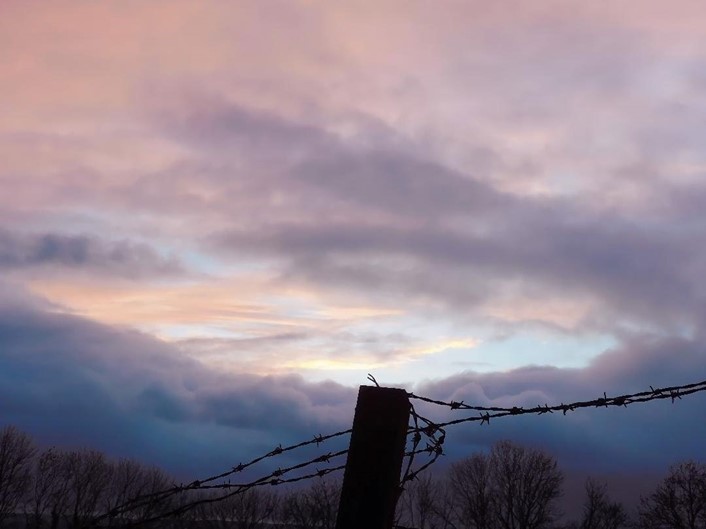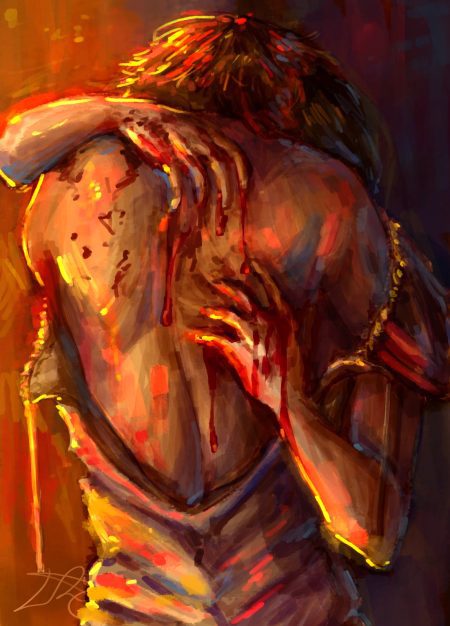by Sophie Nichols
Trigger warning for mentions of suicide
I saw an ad for Marlboros yesterday. Not sure how long it had been plastered there. Had to have been a little while at least. The red MARLBORO was more of a pink than anything else, and the corners of the poster had started to peel back from the brick wall. I wasn’t even going to get cigarettes or anything. Hell, I pass by the damned store every day; never noticed it. But, yesterday I did. For the first time in a long time, I thought about old George again.
He never bought anything but Marlboros, said only real men bought them cigarettes. I think he fancied himself that old cowboy. You know, the white hat, the boots, standing on a rock out in New Mexico, or Texas, or something. Most boys back in Marintown did. Wasn’t much to do back then but daydream. I guess that’s where this all really started.
You see, New York piles up around you in rows of monochrome and concrete. If the sky isn’t buried under a blanket of grey clouds it’s blocked out by smoke. Every damned corner smells like piss and grease, nothing like the pines back home. The sky in Marintown is only ever grey in the wintertime. But then it’s so damned cold no one in their right mind goes outside.
In the summer I could see every star in the night sky. I couldn’t tell you the names of the constellations, but you don’t need to know any of that to appreciate it. The light was so far away you’d think God took a needle to a piece of paper, made you feel small. In a good way and all, and though I never knew nothing about the names and systems, neither did George. Had him calling the big dipper ‘baby spoon’ half the time. George wasn’t stupid or anything, just a little gullible. It was the kind of naivety you’d half admire and half resent. Hell, I half admired and half resented most everything old George did.
I should say our little adventures on a quiet sort of night began when he first got the Ford.
“How’d you manage that?”
He was quite the image coming down the main road into town. I’d been waiting outside my house like I always did. There were plenty that lived on the land outside of town, George included. Up by five , I’d be waiting on the porch for about half an hour before I’d catch him coming down the dirt road. Imagine my shock when instead of muddied converse, a ruddy green truck came chugging towards me.
“Bought it off Old Man Barrow,” he’d shouted out the window, grinning like a madman. “What d’ya think?”
“What do I think? I think I ain’t ever gonna walk again.”
“Well, get on in then!”
The speed limit in town wasn’t high, but we were practically going ninety all the way to class. ‘Course, I wasn’t the only one to admire the truck. We barely spoke in school. I’d long since chosen the life of a social recluse. Back then I thought it might spur some sort of outsider’s inspiration. I went through at least a dozen journals of self-indulgent poetry and thoughts on life. I could detail every back corner of every classroom. Most of my time was spent on bleachers and smoking outside.
Meanwhile, George was on the football field, his hand up a cheerleader’s skirt, homecoming royalty―the kind of person I might’ve despised had I not known him. As I said, the poor Ford saw a lot throughout high school. How many girls did George have in the bed of that truck? Part of me wishes I didn’t know. Any given day I might find a dozen letterman-jacket-wearing idiots piled in that thing. But it didn’t matter much past five. By then it’d be just the two of us and a dozen half-empty coke bottles.
George lived with his dad and siblings on a little piece of land just south of town. On nights when the old man had a late shift at the factory, George and I would take the Ford into the fields and park it. I’d make sure to stock up on cigarettes and pop from the corner store, nip a few magazines and playing cards when my manager wasn’t looking.
“You’ll see,” I said, closing the car door behind me, “the second I graduate I’m outta here.”
“Yeah? And where in the Sam Hill are you gonna go, Tom?”
“I’ll hitch a ride to New York, Chicago, L.A. I don’t know. Anywhere that ain’t here.”
George always had this look, like he was my momma disapproving of something or other. “Yeah, you in New York. Sure.”
“What, you can’t see me in New York?”
He lit a cigarette. “As a matter of fact, no, I can’t. You talk all smart like but you’re a country boy at heart; just like the rest of us.”
“You’re wrong.” So I believed. So I still believe. “I ain’t gonna throw my life away like the rest of the people in this town. Neither are you.”
“What do you mean?”
“You’re coming with me. What did you think I meant?”
“You’re crazy,” he said, shaking his head.
He couldn’t see anything beyond the city limits, nothing beyond the mountains that had cut us off from the rest of the world. On nights like that one when we were sprawled in the bed of his truck, the world may very well have been just the two of us.
“No, I ain’t. Man look at it.” Other than the glow of George’s cigarette the sky had been lit entirely by those stars I was telling you about. It wrapped around us from the horizon to the crowns of our heads, endless and magnificent. Each star gleamed like a beautiful diamond, isolated in a jungle of darkness. And there we were, just two kids without a clue. “There’s a whole world out there, and we’re missing it.” The space between two stars, that was where I wanted to go―those unknown seas of vast shadow, where thrills waited beneath the waves.
I knew that George watched me when he thought I wasn’t looking. For so long I’d assumed it was in admiration, though now I wonder if he was afraid. Not for himself, but for me, that I might find myself stuck between concrete buildings instead of stars.
“They got the same stars in New York as they do here,” he said.
“You’ll see. Once I get my first novel published there won’t be nothing that can stop us.”
I clung to that through the rest of high school, spent my sophomore and junior year fuelled by tickets to the big city.
I didn’t say much when George told me he was gonna drop out of school. He picked up a job at the factory like his dad. Unlike his old man, George didn’t spend his nights with a bottle. Instead, he watched his siblings, made sure that they were fed. I didn’t see him nearly as much. He came to football games sometimes, and we’d still go on late-night drives but never for as long as we used to.
I couldn’t help but feel as if he’d betrayed me, sold his soul away and forgot our dream. George said it was only to keep his family on their feet. He’d be done with the factory by the time graduation came around.
I knew that he was lying. Iron and coal didn’t need a high school diploma, and going back to school once you’d left wasn’t easy. That’s what this stupid town did to men. And once they’d taken all of the coal from the ground, they’d have nothing. I should’ve known then that he was gone, but I didn’t realize what he’d done until it was too damn late.
Cut to the night of my high school graduation, when you might say I became aware that I was dreaming. You see, I only ever tried to pry open George’s window when the measure was called for. I suppose it was overkill that night, but you have to understand where I was coming from. The day for which I had waited a thousand sunrises and sunsets had arrived. May had just come through, but the nights were cold and my fingers numb when his sleep-ridden face gazed up at mine.
“What on earth are you doing here?”
“The better question, my dear friend, is why aren’t you ready?” I asked as I crawled into his room.
I always loved the way he would smile, giddy to hear what scheme I’d come up with. My first audience member. The best of them all.
“What are you on about?”
“The hour is upon us!” I said, extending my arms like a stage magician. “The great swell of our lives has come and it’s time to cut the chains loose!”
Had I been paying any attention I might’ve noticed his smile fall.
“Tom—”
“Take it in,” I said, holding out my two bus tickets, “the tickets to the promised land. I’ve got a cousin in New York. We can stay with him until we have enough for just the two of us.”
“Tom—”
“We can leave your truck at the station when we get there. I’ve got my bags packed, all we need is you. Remember to bring a few comics or something, the bus ride is gonna be hell, oh, and don’t forget to bring that stupid coat of yours, it’s cold in New York.” I’d begun to pace across the room, half examining the state of his unwashed clothes. A few football trophies sat on the shelf, collecting dust. His bed was unmade as if he’d just gotten out of it, and that was when I noticed his untouched bags, the frown on his lips. “Why haven’t you started packing?”
“I ain’t going to New York with you, Tom.”
“What are you on about?”
“Alex sprained his ankle and needed to go to the doctor. I took a few extra shifts to pay for it. Besides, Sarah’s only just started middle school last year, she needs books and all.”
“Your dad can pay for it, George. This is too important.”
“No, it ain’t.” He crossed his arms and remained unmoving. “I ain’t going.” “What—you can’t just not go!”
“Yes, I can.”
“No, no—I waited for this. We both did; I bought the tickets already!”
“I’ll pay you back.”
“It ain’t about you paying me back.” My hands had fallen in disbelief. “What the hell happened to you? First, you drop out of school now you go on and back out of this!”
George’s voice had never sounded so low. “Life happened to me, Tom. Some of us can’t throw things away without blinking.”
“Don’t feel bitter just because you’re a coward.”
“I’m the coward? At least I ain’t running away! Some of us have responsibilities! We can’t just wander around the country and write stupid poems!”
“So that’s it? You’re willing to just throw away our dream?”
“Your dream, Tom. Your dream,” said George, his hands practically shaking as he shoved a finger against my chest. “This was never something I wanted, it was always you.”
“But you said—”
“Nothing! I said nothing! God, with you around I never got the chance!”
My chin was trembling, and however loud I spoke didn’t seem to matter. All that mattered was this, that my dream was dead.
“Well, I’m sorry I had to pick up the slack! But unlike you with your so-called aspirations, I can’t just throw my life away. I won’t rot and waste away in this stupid town!”
“This stupid town is my life! If you can’t see that then maybe it’s better that you go!”
George swallowed his words like he’d just jumped into a freezing-cold river. His blue eyes went all big, the room’s terrible yellow light entrenched in their reflection. All I could do was stare. I hadn’t noticed my hands turn into fists, the knuckles white around my two bus tickets.
What else was there to say?
“Fine.” I shoved past him and towards his window, slipping one foot into the yard before turning back. “Let me know how staying works out for you.”
The last words of a life-long friendship, the last words I ever said to George. My life from there became a series of images, mostly dark silhouettes under city street lights, endless roads where the asphalt met the horizon. It was nothing but one long lucid dream. Buildings so high you couldn’t see the sky towered around my every step away from home. Looking back wasn’t an option anymore. I knew it as well as anything I’d ever known. If I did, I don’t think I’d have stayed on the road for very long.
I never touched Marlboros again. You see, the fact of the matter is, the second I got on that bus I was someone new. New York welcomed me with as much apathy as it did everyone else, and I put my every waking second into chasing words, ideas that slipped away the second they met my fingertips.
Before I knew it Time had spread her beautiful wings and soared as far and wide as the world would allow. I travelled, I met a girl, I broke her heart. She’d blame me for it. I would too. A few stories and poems of mine found their way into journals and competitions, but it was never enough to live by. I got a job, nine-to-five in an office where I could waste time staring out the window. That I did, until there wasn’t much left of me.
My momma wrote every now and again. I always wrote back, kept the peace. We hadn’t been all that close when I was growing up. I think she knew that I would leave long before I did. I couldn’t tell you if she ever held it against me. Half of what she wrote to me was idle gossip, the other her health. She was fine, always worse or better than she should have been. I never lingered on it for very long, at least not until that one letter that she sent last winter.
Even now I remember sitting down to read like I had read all the others. But when I finally did, something inside of me broke. It wasn’t slow or manageable, just the quick shattering of glass. The letter went something like:
Hello darling. I hope all is well, and I’m so sorry to break this news to you. I would’ve called, only, I can’t find the words to say it. I ain’t sure if you remember that young George Foreman boy. I think you went to high school together. You see, Tom… Well, just two nights ago his girlfriend found him in that Ford of his. He was out in the middle of some field. Poor girl, it seems he’d shot himself dead. The whole town is in a craze over it. I know you probably weren’t that close, but I thought you should know.
I saw an ad for Marlboros yesterday, and for the first time in a long time, I thought about old George again. I thought about his truck coming down the dirt road, picking up dust like a great storm. I thought of those late nights and the stars, of when we said goodbye. If I had just fought for him a little harder then maybe he’d still be alive.
Or maybe his life had never hinged on the chains of Marintown, but on that brief moment when I watched him wear his heart on his sleeve and instead of choosing him, I chose to walk away.
Sophie Nichols
Sophie Nichols is a second year creative writing student at UCD.



